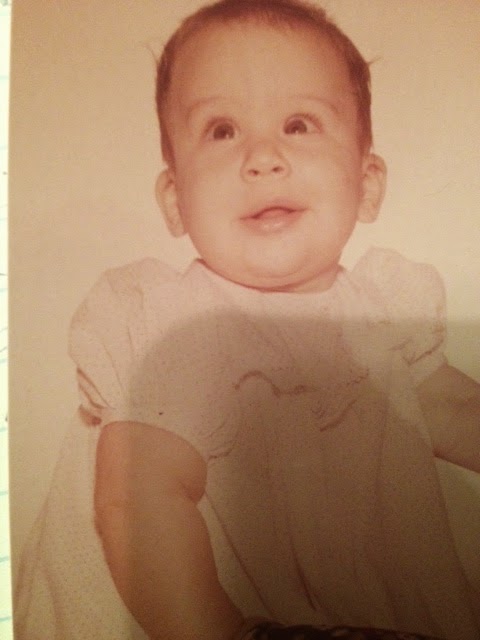The Well-Adjusted Adoptee (and tips on how to raise one)
 |
| Me as a baby |
"I bet she thinks the one who never wanted to search or considers adoption a non- issue is the better adjusted one than the one who had difficulties accepting his adoptedness."
The non-adopted have an idea that a well-adjusted adoptee will mold right into the adoptive family without any problems at all; where in fact I would venture to say the opposite can also be true. The adoptee who proclaims adoption means nothing or never questions how being adopted affects her identity and relationships or never wonders how she became part of this particular family may be really showing signs of denial or may be displaying people pleasing and not genuine attachment.
A questioning, less compliant adoptee -- one who is more in tune with his own needs and feelings and isn't spending an inordinate amount of energy trying to blend in -- is the healthier adoptee. A child who feels safe in bringing their sadness over losses/questions/needs to the parent is the healthier adoptee than the child who never says a word about adoption.
Curiosity about roots and identity is normal, even in adoptees. Rebellion is normal, even in adoptees. Let's not pathologize normal child development just because it has the word "adoptee" attached to it.
Adoption status itself affects both the adoptee and other people's perception of the adoptee which in turn can affect how well an adoptee adjusts to the adoptive family. I have noticed that whenever adoption is brought up, it is usually in the form of one person speaking about an adoptee they know in their family, church or neighborhood. You never hear discussions that start with, "I have this cousin who is biological".
So there is a burden of expectation that comes along with everybody in the family and those outside of the family knowing one is adopted. Outsiders may view the adoptee as "lucky, " "chosen" or just "interesting" but there is no true escape from the label of being adopted, even if one does not choose to identify with being adopted at all (this is a choice that many adoptees make and it too can be considered a healthy acceptance of adoption status).
I have yet to hear even one person say to me, "I was brought into the world the usual way -- through birth into my family". But how many times have you heard, "My uncle and aunt adopted their two kids." When I hear this, I think to myself,
"I bet the two kids appreciate you always describing them as 'adopted' to everyone you talk to."
This is not to say adoption should be shameful or a secret; however, it also does not need to be clarified from biological when speaking to people about adopted cousins, neighbors or church members (Yes, and even in obituaries). Yes, adoption is a fact, but it's also a fact that you were born to the parents who raised you and we don't discuss that in public.
 |
| Me as a happy preschooler |
In addition, I wonder this:
"How does this relative/friend/neighbor really know the adoptee's stance on search and his feelings about being adopted? Through other family or friends or through one comment made by the adoptee to another person?"
These conversations about the adoptee outside of his presence are usually not meant with malice by any means, but it is just assumed that it is o.k. to discuss an adoptee's status and personal feelings about adoption with family/neighbors/strangers as if it is the business of the world that one is adopted and how one feels about adoption.
It is assumed by non-adoptees that proclaiming an adoptee has no adoption issues and never wants to search for biological family is either a compliment or a neutral statement. However to an adoptee (child or adult), it can be a violation of their privacy and a completely misguided assumption. I could tell you stories of adoptees who are secretly searching without so much as a peep to their adoptive families. I rarely tell or announce to anyone my personal feelings about adoption (unless I am blogging about a particular topic). I will share those feelings with other adoptees who are part of my support system. I never shared my feelings about adoption with my family growing up and I still don't.
When one looks different from one's family, strangers do ask questions and stare (sometimes I wonder why people feel so free to ask nosy questions, but that is the general public for you!). These questions can highlight differences within the family. Even family members can point out differences. When I was a kid, my grandmother said to me (outside of my parents' presence), "it was a big disappointment to the family when you and your brother were adopted." A friend of mine was told by everyone he knew (except his parents) that he was a "foster child". You cannot control how others talk to your kids. Preparing your child for other people's "open mouth and insert foot" moments will build resilience in him.
Although the best-case scenario is for the adoptee to feel completely accepted in his adoptive family, there will usually be at least a couple areas where the adoptee may feel they do not fit in. (and adoptive parents' denying this reality only makes it more pronounced). Maybe dad was an athlete in high school and his son dislikes sports. Maybe mom was a beauty queen and her daughter is average looking. Maybe the siblings have nothing in common. These differences happen in biological families as well; however, without the genetic connection, it is more likely to happen in adoptive families. Similar genetic traits run in families as do physical resemblances, which many adoptive families lack. Its best to help and prepare your kids for accepting differences early on -- rather than denying them.
Differences between adoptee and parents/siblings do not indicate a problem with the adoptee-- it just indicates that the adoptee's genetics/personality/way of being in the world may not mesh with the adoptive parents' or siblings' genetics/personality/way of being in the world.
 |
| My mom and I |
Pointing out differences in no way implies that adoptees cannot mesh well with their adoptive families It can and does happen and that's a good thing. However, it is not the responsibility of the child to change or bend into being a carbon copy of the parents. It's not the child's responsibility to stifle their natural curiosity about where they came from in order to placate the parents. The adoptive parents have the greater responsibility to meet the child where he or she is. If there are obvious differences between the child's looks, interests, beliefs, etc. the parents need to adjust -- instead of asking the chlld to be the one to adapt. If a child is asking questions about his background, the parents should provide any and all information available and then go above and beyond that, and seek out the information and answer all questions honestly and age-appropriately.
Accepting differences in adoptive families is healthy. Denying the differences and asking your child to morph into somebody he is not to adapt to the adoptive family is unhealthy and will backfire in the end. A well-adjusted adoptee is usually the result of loving, accepting and realistic adoptive parents who put their child's needs and feelings above their own.
Some guidelines when you think you "know" what an adoptee really feels about their own adoption:
1. Assume nothing when it comes to adoption (example: some adoptees "feel" abandoned by their birth families; many do not).
2. Avoid repeating stories to other people about what your assumptions are, because many times you are wrong.
3. If you are the parent or family member, listen to the adoptee, especially for information leading you to believe the opposite of your assumption may actually be true. (Example: "I don't really care about my birth mother. She didn't want me anyway.")
4. Parents: Be open and initiate conversations about adoption status, your child's birth family, genealogy and identity questions. Discuss similar and different traits, interests or beliefs in a positive way.
5. No comparisons with siblings, cousins or friends. Just don't do it.
6. Show a non-threatened front (regardless of how you really feel) regarding birth family members and discussions. (and show the proper empathy if your child says she wishes she could see them when she cannot).
7. Do not discuss the adoptee's adoption with other people, unless there is a good reason to do so (doctors, therapists, support system, etc). Let your child be the one to own his or her adoption story.
8. Ditto for your child's birth story.
9. No platitudes or "chosen child" stuff. Be honest and be real.
10. Love your child for who they are, not who you want them to be.



Here is how I describe being adopted to non-adopted people(who never are quite able to "get" what I am talking about.) It is like someone drugged you and erased your memory and took you to the other side of the earth. You don't look like anyone, you don't speak the language or know the customs...you are not even sure ***what*** happened, because you have no reference point. You do your best as a child to fit in, mimic temperaments, mirror the group values, be what you think they want. Finally, when you reach adulthood and figure out the magnitude of what happened to you, you journey back to the other side of the world again and there, you find people who act like you, who **think** like you, who share your values, your temperament(wow genes are so powerful you think, I had NO idea what everyone else started out with from the beginning. "What a head start!" you think.)...but by this time, everyone has gone on-made new lives, most don't remember you, some say it isn't really you...and you find yourself between two worlds. It sucks, but the good part is at least you know who you are for the first time. And from there you can move on honestly into a life that honors your values and who you are. That is the best way I can describe it to others.
ReplyDeleteGreat analogy and thank you!
ReplyDeleteDuring my first month of blogging (waaaay back) I recounted a conversation I'd had with someone that makes me think of your early point in this post. http://lavenderluz.com/2007/05/triad-view-adoptions-are-meant-to-be-closed-2.html
ReplyDeleteThis is all great advice. I'm going to share it.
Thank you, Lori!
Delete